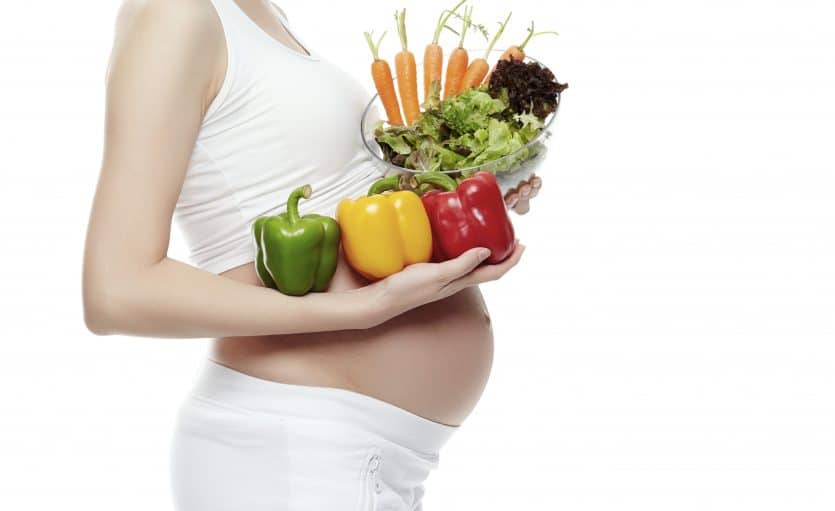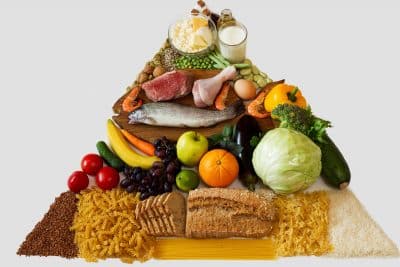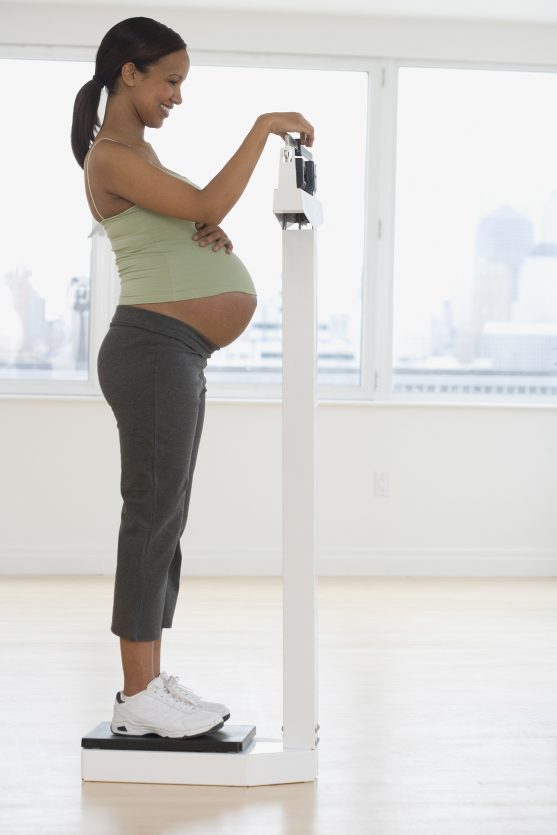
Pregnancy is the one time your eating habits can directly influence the health of another person. It’s one of the most nutritionally demanding times in a woman’s life. Pregnancy nutrition requirements are higher to support the rapid growth and development of a baby. And the extra nutrition is needed to strengthen the nutritional reserves of the mom-to-be.
A mother’s eating and lifestyle habits can have profound, life-long effects on the health of her child. A healthy, well-nourished woman is more likely to experience a healthy pregnancy. That includes fewer pregnancy-related complications, which increases the chances of delivering a healthy bundle of joy. A healthy baby has a better chance of growing into a healthy child and, someday, a healthy adult. And don’t forget the nutritional and lifestyle status of the father. His role in the healthy creation of a baby is equally important.
You Are What Your Mother Ate: Pregnancy Diet Planning Starts Early

You are what you eat. And so is your baby. Planning a healthy pregnancy should begin well before a pregnancy happens. Some experts recommend making healthier eating and lifestyle choices at least six months before trying to conceive.
It’s also the best time to start taking a prenatal multivitamin/mineral supplement that provides folic acid or folate. This important B vitamin, consumed as part of a healthful diet may reduce a woman’s risk of having a child with brain or spinal cord defect. When consumed before conception, helps prevent neural tube defects. Current guidelines recommend that women of childbearing age consume at least 600 micrograms of folic acid daily from all sources.
Pregnancy requires extra energy, building blocks, and cellular assistants. So, making good pregnancy nutrition choices throughout all three trimesters is essential. Infant birth weight, rate of growth after birth, and ongoing health can be influenced by pregnancy nutrition, lifestyle, and the health status of the mom-to-be.
Pregnancy Nutrition—Weight Changes and Calorie Requirements
A pregnant woman is not eating for two. Sure, there are extra calorie requirements during pregnancy.
But that saying isn’t quite accurate. Calories should gradually increase to meet demands as your baby grows and develops.
During the first trimester, no additional calories are required. Daily requirements change in the second trimester. At that time, about 340 additional calories a day are needed. The recommendation increases to 450 extra calories per day in the third trimester to continue meeting the growing demands of the baby-to-be.
Over the course of a healthy pregnancy your body also stores fat for energy needs during labor and delivery. This also supports breastfeeding—if you breastfeed your baby. These additional calories are not an invitation to splurge on doughnuts, chips, cookies and ice cream. You’re building a baby, so choose wisely.
These extra calories and fat storage often mean weight gain. That’s normal. Requirements for appropriate weight gain during pregnancy differ depending on the current weight of the mom-to-be. An average weight women should gain 25–35 pounds. Underweight women may need to gain 28–40 pounds. And an overweight or obese mom-to-be should aim to gain 11–25 pounds, depending on their weight
Macros and Micros, Oh My!

There are two types of nutrients: macronutrients and micronutrients. And the difference is the amounts you need. Macronutrients, like fats, protein, and carbohydrates, are required in large quantities in the diet (grams). Micronutrients—as the name suggests—are needed in smaller amounts (milligrams or micrograms).
Pregnancy changes these amounts somewhat. Carbohydrate requirements during pregnancy increase from about 130 to 175 grams/day and protein needs by about 25 additional grams per day. Most women already meet these requirements. During pregnancy your body needs a little more fat. About 25 percent to 35 percent of your daily calories should come from fat to support a healthy pregnancy. Consuming the right types of fats is also important. The majority of fats should come from monounsaturated (MUFAs) and polyunsaturated (PUFAs) fats.
Strive to eat nutrient-rich proteins, complex carbs, and essential fats every day. Include a variety of lean protein sources, whole grains, healthy fats, dairy, vegetables and fruit to help meet the changing nutritional demands of pregnancy. The nutritional needs of a developing baby will take priority over the needs of the mom-to-be, so it’s important to eat well.
While all nutrients are important to support a healthy pregnancy, certain vitamins and minerals (micronutrients) play a particularly important role during the development of an infant. Here’s a list of these micronutrients, how they impact pregnancy, and foods to eat:
- Vitamin A is important for baby’s overall growth and development. It also plays a role in vision, protein synthesis, and cell differentiation. Sources of preformed and provitamin vitamin A include beef liver, orange, red, yellow and green leafy vegetables, dairy products, and eggs. You’ll also find vitamin A in fruits like cantaloupe and fortified breakfast cereals.
- Vitamin D is important to support healthy development of bones, teeth, skin and eyesight. It is unique among vitamins because it works more like a hormone at the DNA level. Vitamin D has been estimated to regulate 200–300 genes. Many cells have vitamin D receptors and need it to function properly. That includes cells in the skin and brain. Vitamin D is naturally produced through skin exposure to sunlight. Skin color, age, and time of year can impact the amount of vitamin D produced through skin exposure.
Very few foods naturally provide vitamin D. Fatty fish and egg yolks are natural food sources. Other sources include fortified foods such as dairy products, ready-to -eat breakfast cereals, or dietary supplements.
- Calcium is necessary for proper development of bones and teeth (in combination with vitamin D) and baby’s calcium status. Consuming adequate calcium supports healthy development of bones and teeth buds for baby. It also protects mom’s bones from pregnancy-related calcium loss. If a mom-to-be doesn’t get enough dietary calcium, her body will pull calcium out of her bones to compensate.
Rich sources of calcium include dairy products- milk, cheese and yogurt. Other good sources include fortified foods and drinks, such as breakfast cereals and orange juice, and soy beverages. Canned sardines and salmon packed in oil with bones, Chinese cabbage, kale, and turnip greens are also sources of calcium.
- B vitamins are primarily used as cofactors in energy metabolism. They are water-soluble. That means your body doesn’t store them and unused amounts exit in the urine. While all B vitamins are important during pregnancy, folate (folic acid) and B12, provide additional crucial roles in the development of the central nervous system. And this essential system is completely formed during the first few weeks of life.
Vitamin B12 is vital for producing red blood cells, genetic materials, healthy neurological function and DNA synthesis. Deficiencies during pregnancy may cause neurological damage in the baby. A deficiency of B12 at the beginning of, and during pregnancy, could increase risk of certain birth defects, neurological impairment, and contribute to preterm birth.
The best food sources include animal products such as fish, meat, poultry, eggs, milk, and milk products, and fortified foods like breakfast cereals. Plant foods are not a good source of vitamin B12.
Folic acid or folate, plays an essential role in synthesizing DNA in cells and for manufacturing neurotransmitters. It is very important during early pregnancy because of its essential role in the healthy development of baby’s neural tube. The tube becomes a baby’s brain and spinal cord. The neural tube is formed early during the first month of pregnancy, often before any noticeable signs of pregnancy. Consuming adequate folic acid before and early in a pregnancy as part of a healthful diet may reduce a woman’s risk of having a child with spina bifida (spine) and anencephaly (brain).
The best natural food sources of folate include vegetables (asparagus, broccoli, Brussels sprouts), legumes, nuts, and seeds. Folic acid is also found in multivitamin supplements.
Deficiencies of folic acid and vitamin B 12 should be avoided by all women of childbearing age by supplementing with these important B vitamins, especially before becoming pregnant.
- Choline supports the structure and function of the brain and spinal cord during fetal development. Many pregnant women do not obtain adequate amounts of choline through the diet.
Good food sources of choline include meat, poultry, fish, dairy products, and eggs. Also cruciferous vegetables, soy beans, kidney beans, whole grains, nuts, and seeds. Choline is typically included in combination with B-complex vitamins in most multivitamin supplements.
- Niacin is another type of B vitamin—B3, to be exact. Just like the other B vitamins, niacin is water-soluble. So it’s not stored in your body, and unused amounts are excreted through your urine. Niacin is important for converting food to energy. But is also supports the digestive system, skin, and nerve function. A study has linked higher blood levels of niacin (B3) during pregnancy to healthier skin outcomes in babies at 12 months of age.
- Iron is required in higher amounts during pregnancy. That’s because an expecting mother’s blood volume expands due to dramatic demands of the developing baby and placenta. Building a baby requires adequate iron for normal healthy development. Iron also plays a key role in cellular metabolism. It’s a component of hemoglobin, which allows red blood cells to carry oxygen throughout the bod. This ensure that your baby gets the oxygen needed for healthy development.
Not only is iron critical for the appropriate neurodevelopment during fetalhood, it is also important after birth during early childhood development. Adequate iron intake during pregnancy may help support a healthy birth as well as a safe and normal delivery and post-delivery health of both mother and child.
The best food sources include fortified breakfast cereals, meat, seafood, white beans, lentils, and spinach.
- Zinc is another important mineral during pregnancy. This is especially true during the first trimester, when baby’s organs are forming. It is also thought to assist in the development of the immune system. Zinc is also important after baby’s birth to assist in the first important stages of infant growth and development.
Best food sources include oysters and other seafood, red meat, and poultry. Other good food sources include fortified breakfast cereals, beans, nuts, whole grains, and dairy.
- Magnesium is a cofactor in over 300 enzymes in the body. Adequate magnesium intake is associated with healthy fetal growth and full-term delivery.
Good food sources include: green leafy vegetables, legumes, avocado, nuts, seeds, whole grains, and fortified breakfast cereals.
- Iodine is an essential component of the thyroid hormones that regulate many important biochemical reactions. Thyroid hormones impact protein synthesis, enzymatic, and metabolic activity. Iodine is essential during pregnancy to support the healthy growth and the development of a baby’s brain health, skeletal system, and metabolism. Iodine deficiency has multiple adverse effects on growth and development, including the mental health of the baby. A substantial portion of pregnant women are iodine insufficient.
Good food sources include: seafood, seaweed, dairy products, eggs, grains, poultry, and baked potato with the skin.
- Essential fatty acids are important for developing babies. And many women don’t get enough from diet alone. During pregnancy, fats provide energy and help build fetal organs and the placenta. Omega-3 fatty acids, particularly DHA, support brain, eye, and nerve development—especially during the last trimester. DHA and the omega-6 fatty acid arachidonic acid are the predominant fats found in the nerve cells of fetal and infant brains. Unfortunately the modern diet is often low in omega-3 fatty acids.
Good food sources include: vegetable oils, fatty fish, olives, avocado, nuts, and seeds.
Both macros and micros are very important to build a healthy baby and support the health of the mom-to-be. The foods eaten during pregnancy are important, so choose wisely. And don’t forget the importance of a prenatal vitamin/mineral supplement to cover any dietary vitamin or mineral shortfall.
Give the Gift of a Healthy Lifestyle

Adopting a healthy lifestyle is also important for supporting a healthy pregnancy and baby.
Regular exercise during a healthy pregnancy helps reduce excessive weight-related pregnancy complications. And exercise is important to support overall health and wellbeing. The American College of Obstetrics and Gynecology recommends 30 minutes or more of moderate exercise per day on most if not all days of the week. There are exceptions for those with a medical concern/condition or a pregnancy complication. Always check with your healthcare professional for questions about exercise patterns.
Emotional stress during pregnancy can affect the development of the fetus—especially the brain—during any stage of pregnancy. Everyday stress is considered somewhat annoying and a routine part of modern life. But chronic high stress can boost the risk of a preterm birth and the delivery of a low-birthweight baby. So, make self-care a priority during this important time in life. Learning to manage, reduce, or eliminate stress will support a healthier pregnancy and baby.
If you smoke, stop before becoming pregnant. Smoking during pregnancy increases the risk of developing lung problems, learning disabilities, and physical growth even after birth. It is strongly advised that pregnant women quit smoking for the duration of the pregnancy. Your baby’s life could depend on it.
It’s OK to consume alcohol in moderation before becoming pregnant. But it’s very important to discontinue drinking alcohol completely when you become pregnant. Alcohol can pass freely through the placenta. So, when you drink alcohol, your developing baby does, too. Even small amounts of alcohol may impact your baby’s brain development.
Cut back on caffeine. While not well-understood, consuming high amounts of this stimulant has been linked to impaired growth and increased miscarriage risk. The American College of Obstetrics and Gynecology suggests limiting caffeine consumption to less than 200 mg per day (the amount in about two cups of coffee).
Talk to your doctor about medications (prescription and over-the-counter) you are taking, including the use of dietary or herbal supplements. If you have a medical condition, make sure it is well-controlled.
Food safety is also important. Take extra precautions to avoid exposure to food-borne pathogens. Infection from food-borne illness can cause harm the mom and her developing baby. Avoid raw or undercooked meat, seafood, or egg items. Unpasteurized milk, cheeses made from unpasteurized milk—like brie and feta—and unpasteurized juice should also be avoided. To protect you and your developing baby wash all fruits and vegetables thoroughly before eating. Avoid anything that cannot be properly washed, or foods that are known to be a high-risk for food-borne illness.
Pregnancy Nutrition Helps You Build a Healthy Baby

Pregnancy is a critical time in human development. And nutrition is a vital component of a healthy pregnancy and outcome. A baby cannot develop into a healthy, thriving human without the proper building materials to support healthy development. Diet and lifestyle habits impact all stages, starting with your future fertility. They help determine your child’s nutritional health and birth weight. And your diet and lifestyle provide a model for children’s future eating habits from fetalhood, childhood and into adulthood.
Proper prenatal care has many facets. It starts with adopting a healthy well-balanced eating plan, which includes a quality vitamin/mineral supplement before and during pregnancy. And that’s combined with a healthy overall lifestyle. Taking these steps is one of the greatest gifts you can give to your future kids.
Article Source: https://askthescientists.com/pregnancy-nutrition?id=13550953&source=copiedlink

Comments
Post a Comment